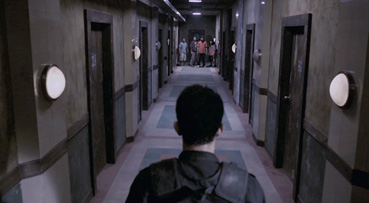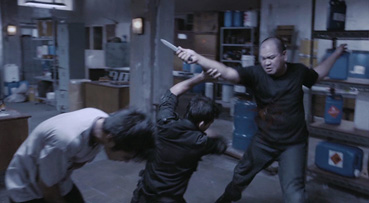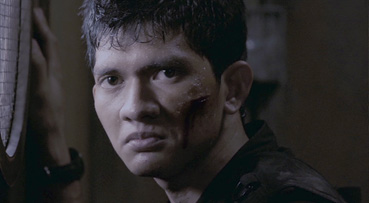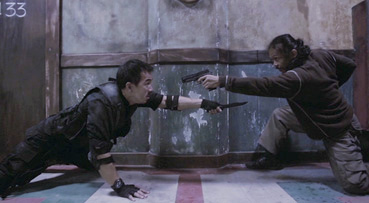|
If you were compiling a list of the countries in which the finest action movie directors were born, which do you think would be in the top three? Hong Kong, perhaps? America? Maybe even France or China or Korea? How about Wales? You heard me. It's early days yet, but on the basis of his last two features alone, Merthyr Tydfil-born Gareth Evans is currently leaving his stateside colleagues fumbling in the dust. Of course, there's no good reason why you would even be aware that Evans hailed from Wales in the first place. The name may seem a giveaway, but when your second and third features are shot in Jakarta in the Indonesian language and feature a regionally specific fighting style, no-one would forgive you for suspecting this is a pseudonym. Evans is not a master martial artist, nor was he born into a filmmaking family, but even as a student at the University of Glamorgan he was drawn to the East. For his graduation film, he wrote and directed a historical drama set in Edo period Japan, which was locally shot with a cast comprised of Japanese students. A subsequent low-budget feature, Footsteps, led indirectly to the chance to direct a documentary on a Malayan martial art known as Pencak Silat, which fascinated Evans enough to transport him to Jakarta. And this is where his film career really began.
His second feature, Merantau, was released in he UK as Merantau Warrior to clarify its content for those not well versed in Indonesian culture. It's a film we at Outsider were asked to cover when it was released on DVD, but the review disc arrived almost a week after the release date and thus ended up on my "must watch soon" shelf. When I did get around to seeing it I was kicking myself for not making time to do so earlier. I've had a long-standing affection for martial arts cinema, but have seen enough fair-to-middling genre films in recent years to become a little jaded about any new arrival. But Merantau was a bit of a revelation, a martial arts film in which as much attention was paid to story and character as to the action content. And the action was superb, a scorching blend of painful stunt work and furious combat that introduced the world at large to the Pencak Silat fighting style and a potential new genre star in the shape of Iko Uwais. Comparisons made to Tony Jaa's debut feature Ong Bak were not far short of the mark.

Despite the fact that two months had by then passed since the release date, I got stuck into a review anyway, being keen to spread the word on this not widely seen film, but five paragraphs in became overwhelmed by the demands of more recent releases, and the review became one of a number that still sits unfinished in my pending folder. I was thus more than a little excited to learn that Evans and Uwais had reteamed for a second film that was attracting similarly enthusiastic reviews, and a lot more of them. Here, however, story takes a back seat to the action, and when I say back seat I'm talking about that one at the rear end of the longest coach in the fleet. A Jakarta SWAT team under the command of Lieutenant Wahyu (Pierre Gruno) and lead by Sergeant Jaka (Joe Taslim) launch an armed assault on an apartment block controlled by ruthless criminal overlord Tama Ryadi (Ray Sahetapy), whose swift and violent response kills most of the squad in a matter of minutes. As the remaining soldiers fight for their lives, one of them, Rama, embarks on an altogether more personal mission. And save for a couple of not too surprising later twists and a few brief character scenes, that's about it. Yep, if you came for the plot, you're likely to be left wanting. But if you came for the action... ah, that's a very different story.
According to Evans, the decision to kick things off so quickly was a response to criticism that we had to wait so long for the first fight in Merantau. Personally, I rather liked this, echoing as it did similarly effective teases in The Big Boss and Ong-Bak, which also took their time to build up anticipation about the hotly anticipated fighting skills of their respective new stars. Here Evans gets to have his cake and eat it, again delaying Rama's first fight for the first half-an-hour but filling the gap with explosive gunplay and the team's tense and desperate fight for survival. And given that this is the sort of thing you'll find in a hundred generic American action movies, the fact that what unfolds here feels so fresh and exciting is little short of miraculous.
The furious gun battles and the resourcefulness of the pinned-down survivors almost make you forget you're watching a martial arts film at all, but when the first fight kicks off you're left in absolutely no doubt. Blisteringly performed and choreographed (by Evans, Yayan Ruhian, and leading man Uwais), these scenes are object lessons in how to showcase close-quarters physical combat, the kinetic camerawork and the breathless editing never obscuring the dynamism, physicality, and jaw-dropping skills of the lead performers. Evans knows his martial arts movies and has clearly learnt from them, repeatedly showing an almost instinctive understanding of possibilities and pleasures of these films. He acknowledges (and neatly sidesteps) the genre's sometimes cloying sentimentality with a few brief reminders of Rama's young pregnant wife, and its penchant for painting characters in black-and-white terms with a bad guy so morally bankrupt that he pauses his lunch to casually execute a line of handcuffed and kneeling prisoners. He even makes the last one wait while he fetches more bullets, then opts to kill him with a hammer instead. But Evans also kicks against at least one tradition with a climactic fight that pits two heroes against a single skilled villain (enigmatically played by Yayan Ruhian), risky in a genre where underdogs tend to incite audience sympathy by default.

What really separates the fights here from their Hong Kong equivalent is the Pencak Silat fighting style, in which blows are delivered at lightning speed with fists, feet, knees, elbows and just about anything else that comes to hand. The brutality is further enhanced by some wincingly effective post-production image manipulation – weapons are plunged into bodies, heads collide with walls, backs are broken, and in one particularly gruesome case a fighter has his throat impaled on the spiky wooden remnants of a broken door. But the violence itself is never dwelt on nor showcased with slow motion replays, and thus functions as intended, as a seamlessly integrated, game-upping component of a violent but exquisitely choreographed whole.
Whether you respond to very specific pleasures of The Raid will likely depend on your feelings about martial arts cinema in general, and whether you accept that the brutal beauty of the combat is appropriate compensation for a paucity of plot and character depth. I've spent some time trying to reconcile my weariness for depth-free modern Hollywood actioners with my almost lifelong love of equally shallow martial arts cinema, and have long since given up trying to find a logical answer. It's clearly a personal thing – explosions don't excite me, but the grace and skill of choreographed physical action and performance clearly does, whether it be mind-bending flexibility and balance of Chinese acrobatic theatre, the exquisite dancing skills of Gene Kelly and Fred Astaire, or the speed, agility and precision of screen fighters like Bruce Lee, Jackie Chan, Tony Jaa et al. Just as the raison d'être of musicals is their dance numbers and songs, martial arts movies live or die by the quality, energy and physicality of their fight scenes, and on this score The Raid leaves the current competition standing. It goes without saying (but I'm going to say it anyway) that those with a bug up their behinds about movie violence should probably give this a wide berth, but action fans, and particularly martial arts movie devotees, should run up to the film and give it a loving and grateful hug.

With Hong Kong cinema still struggling to rediscover its action heyday and Thai hopeful Tony Jaa failing to capitalise as expected on the international impact of Ong-bak, martial arts cinema has been in an unfocussed state of flux for some years now, waiting for a new star to re-invigorate the genre and expand its potential audience. It's a little early to start making wild predictions for dynamite team of director Gareth Evans and leading man Iko Uwais – I was, after all, similarly optimistic for the performer-director team of Tony Jaa and Prachya Pinkaew – but on the basis of their first two films together alone, the signs are strong that they are the boys for the job.
More and more we're seeing feature films shot digitally on cameras that can be bought for less than you once paid to hire one, and The Raid continues the trend with the Panasonic AF100, a camera you can pick up for under £4,000 if you shop around. Without immediate access to the Blu-ray, I can't say how the film shapes on HD, but the DVD transfer is a solid enough one, albeit with a couple of small caveats. In common with so many modern action movies, the image has been tweaked in post-production, with the colour toned down and given a steely hue, which is faithfully reproduced here with no obvious image softening or loss of detail. More challenging for the DVD transfer are the low light sequences, particularly the neat shot (there are a lot of neat shots here) when an exposure shift reveals the presence of line of gloom-swathed gangland gunman, and the darker areas beak up into visible artefacts. The aspect ratio is 1.78:1 and the image is anamorphically enhanced.
The Indonesian Dolby 5.1 surround track is a lively affair, being clean, punchy, and making inclusive and direction-specific use of the full surround stage. There's also a 5.1 English dub, and by English I mean American English, with the majority of the dialogue delivered in that "Fuck you, asshole!" manner that makes such tracks so unintentionally comical. There has also been little attempt to match the voices on the dub to the location sound, resulting in dialogue that is louder than it should be and acoustically divorced from the surrounding action. Director Evans had no involvement in the dub – on the commentary track he reveals he is hearing it for the first time.

Also included is a descriptive track for the vision impaired, an admirable inclusion that is absolutely worth checking out for the fight scenes alone, when a female voice informs us in BBC English, "Rama launches a roundhouse kick into the ponytail guy's face, splitting his nose open," and suchlike. The dialogue here is the English dub.
The CG animated menus are also noteworthy, though do look like they've been designed more for a video game than a movie, a game I'm surprised hasn't actually appeared yet.
Director's Commentary
Director Evans is joined by actor Joe Taslim (who plays Sergeant Jaka) for a lively commentary that delivers a wealth of information on the production and the shooting of specific scenes, including some interesting technical info about how some sequences and even shots were filmed. There are also some nice low budget filmmaking tips here, my favourite being the ultra-slow-motion shot that they were only able to capture with the AF100 by shooting at double speed and having the actor move really slowly. Great stuff. Only one gripe – more than once Evans refers to a second commentary track that is not included here, and as far as I'm aware is not on the Blu-ray either.
Behind the Music with Mike Shinoda and Joe Trapanese (10:37)
A tightly constructed and consistently interesting featurette in which Mike Shinoda (co-founder of the band Linkin Park) and Joe Trapanese talk about their approach to creating the film's driving, beat-driven electronic score.
The Raid Fan Film (0:42)
A brief Japanese anime trailer for the film, made by Philip Askins for Anime Central.
Claycat's The Raid (2:46)
A micro-budget Claymation short, made by Lee Hardcastle, that compresses the entire film into less than three minutes and has all the human characters played by animals. Ingenious and fun.
Featurettes (12:17)
A collection of four brief but enthralling conversations between Gareth Evans and Mike Shinoda in which they discuss which was the toughest scene to shoot, Shinoda's involvement in writing the score, and a hair-raising incident that occurred when shooting a back-breaking stunt. There's also a promo for the music score.
The are also four Trailers, two for The Raid (1:32 / 1:29), one for the Hong Kong based video game Sleeping Dogs (4:23) and one for battle simulation experience WarFighters.
Unless martial arts movies really aren't your cup of green tea, this time it's OK to believe the hype. A breathless, brilliantly choreographed and performed series of Pencak Silat battles held together by a threadbare but functional plot, The Raid wipes the floor with current western action cinema and confirms Evans and Uwais as the boys to watch. Momentum's DVD delivers on picture and sound but is very likely topped on both counts by the Blu-ray, which also has a couple more extra features, though apparently not that second commentary that Evans refers to. For fans of martial arts cinema in particular the film and disc still come enthusiastically recommended, though I'd pay the extra and go for the Blu-ray over the DVD.
|